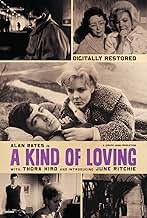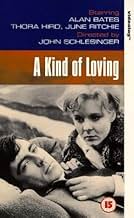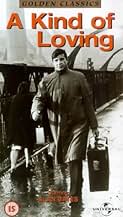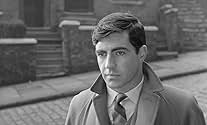VALUTAZIONE IMDb
7,3/10
2852
LA TUA VALUTAZIONE
Aggiungi una trama nella tua linguaAfter his girlfriend's pregnancy forces him to marry her, a young man must adjust to his new life and contend with his domineering mother-in-law.After his girlfriend's pregnancy forces him to marry her, a young man must adjust to his new life and contend with his domineering mother-in-law.After his girlfriend's pregnancy forces him to marry her, a young man must adjust to his new life and contend with his domineering mother-in-law.
- Regia
- Sceneggiatura
- Star
- Nominato ai 4 BAFTA Award
- 1 vittoria e 4 candidature totali
Recensioni in evidenza
There's a frustrated young man, name of Vic, from a pool of young ladies he's picked, Ingrid Rothwell's her name, with a blonde flowing mane, she's the lass with whom he wants to tick. Ingrid's just as fond of this lad, now he's making advances she's glad, but he runs hot and cold, wants to do more than hold, so she lets him explore and un-clads. No surprise as nature takes its course, with a marriage hastily brought forth, which Vic starts to abhor, lives with Mother-in-Law, and his compass no longer points north.
Great dialogue, great performances, in a perpetually told tale of the ages, where the outcomes invariably reflect the times when the drama takes place, and leave you grateful for the times you live in today - I think it's called progress.
Great dialogue, great performances, in a perpetually told tale of the ages, where the outcomes invariably reflect the times when the drama takes place, and leave you grateful for the times you live in today - I think it's called progress.
Hormonal trainee draughtsman Alan Bates fancies nice-but-dim typist June Ritchie.Er,that's about it really.Formula kitchen sink plot,sub-sub John Osborne/John Braine characters.Sit and watch it in the 3/9d seats whilst stuffing your face with Smith's crisp(watch out for the little blue bag containing salt) and smoking your "Strand".Turn off your brain and put your hand on your girl friend's knee.Well,that's what I did in 1963,but after about 3 minutes screen time I realised I was watching something exceptional.Somehow John Schlesinger had turned this sow's ear into a beautifully observed,moving life-affirming work of art. As an entity this film is so much better than the sum of its parts. The plaintive brass band music adds immeasurably to the atmosphere. June Ritchie is heartbreaking as the naive Ingrid and Alan Bates gives what is arguably his best film performance. The exteriors are well-chosen,the photography elegaic. All the elements for a clichefest are present,but,dammit,it turns into a tour de force.
This film reflects on how social and economic pressures impact on sexuality and relationships. Class, politics, working life, changing attitudes about gender and marriage, and even scarcity of cheap housing are all referred to or explored. Against the wider social backdrop the character of Ingrid's mother represents repression and rigidity to a large degree, although even she is shown with some saving graces. All the characters here are cast in shades of grey, all internally conflicted, all in a cauldron of social pressures. The film ends with the maturing of the main characters, and also with a note of hope. An excellent script, excellently directed and acted, and a brilliant evocation of another era.
10hague-1
I can watch this touching film over and over.
The black and white enhances the dramatic landscapes and atmosphere.
My favourite scene is the railway station where Vic hits rock bottom.
I also like the shelter scene as Vic pushes his luck and the picture pans back to the carved inscriptions.
It makes me wish I had been born in those times, with community spirit, dance halls and pubs with conversation for entertainment, football terraces and steam trains.
It is also interesting to spot so many young actors who found later fame such as "Nora Batty", James Bolam, Leonardo rossiter etc.
The black and white enhances the dramatic landscapes and atmosphere.
My favourite scene is the railway station where Vic hits rock bottom.
I also like the shelter scene as Vic pushes his luck and the picture pans back to the carved inscriptions.
It makes me wish I had been born in those times, with community spirit, dance halls and pubs with conversation for entertainment, football terraces and steam trains.
It is also interesting to spot so many young actors who found later fame such as "Nora Batty", James Bolam, Leonardo rossiter etc.
I own very few movies - this is one of them. I've seen it many times and am always moved.
It is of course part of the special "Angry Young Man" genre that includes Billy Liar, The Loneliness of the Long Distance Runner, The Entertainer, Darling, A Taste of Honey, This Sporting Life, Look Back in Anger, Room at the Top, Saturday Night and Sunday Morning - and in later years, In Celebration and The Homecoming.
Such novelists/playwrights as John Braine, Alan Sillitoe, David Storey, John Osborne, Arnold Wesker, John Wain, Shelagh Delaney, directors like Karel Reisz, John Schlesinger, Lindsay Anderson and Tony Richardson, and such screenwriters as Waterhouse and Hall (who wrote this as Billy Liar).
The movies are primarily about men trapped by place and morality -- and either lashing out/escaping or trying to accommodate themselves to their situation. Most are set in the north of England - all are about people from working class backgrounds.
Stars like Richard Harris, Julie Christie, Alan Bates, Ian Holm, Albert Finney, and Tom Courtenay broke in their film teeth with these movies - and others such as Richard Burton, Lawrence Olivier, Laurence Harvey and Dirk Bogarde revealed their expansive range.
The protagonists are often not likable - certainly the pitiful Archie Rice in The Entertainer, Burton's character in Look Back in Anger, Finney's in Saturday Night and Sunday Morning, Courtenay's character in "Long Distance Runner" or Richard Harris' character -- are all people you'd rather not accompany on a long train journey.
However, Vic Brown, the protagonist in this one - is largely sympathetic (and wonderfully written and portrayed). His plight is just so realistic - and the consequences so easy to believe.
There are many things that our lad gets wrong - unable to break things off with a woman, he simply ignores her (and speaks badly of her to others) - yet is helpless when she suggests they get together again. In part, this is because his lust masters him - and in part because he just can't bear to tell someone he no longer wants to see her.
As awful as most audiences will find Ingrid's mother (wonderfully played), one can also have sympathy for her - a widow overly protective of her only child, and the circumstances in which her child finds herself.
The modesty of the characters is wonderful yet not overly done - it is the characteristic that yields immense sympathy in the viewer - this is especially true of the Brown family - from "our Christine" and her gentle husband to Vic's wonderful father and brother to his forceful mother.
Most of the reviews speak of this very much as a look back in time - I think it's not so past.
The themes are universal and timeless: lust and its consequences, indecision about a romantic partner, the division between a young person's caution about taking the right steps in life and closeness to family vs. inchoate yearnings to do great things far away - these are the stuff of such plays as The Fantasticks and such movies as It's a Wonderful Life. (Donna Reed's character wanted Jimmy Stewart's no less than Ingrid wanted Vic - and both men had dreamt to be far away doing great things).
This is wonderful - it will strike anyone as sharply observed, wonderfully written - and very moving.
It is of course part of the special "Angry Young Man" genre that includes Billy Liar, The Loneliness of the Long Distance Runner, The Entertainer, Darling, A Taste of Honey, This Sporting Life, Look Back in Anger, Room at the Top, Saturday Night and Sunday Morning - and in later years, In Celebration and The Homecoming.
Such novelists/playwrights as John Braine, Alan Sillitoe, David Storey, John Osborne, Arnold Wesker, John Wain, Shelagh Delaney, directors like Karel Reisz, John Schlesinger, Lindsay Anderson and Tony Richardson, and such screenwriters as Waterhouse and Hall (who wrote this as Billy Liar).
The movies are primarily about men trapped by place and morality -- and either lashing out/escaping or trying to accommodate themselves to their situation. Most are set in the north of England - all are about people from working class backgrounds.
Stars like Richard Harris, Julie Christie, Alan Bates, Ian Holm, Albert Finney, and Tom Courtenay broke in their film teeth with these movies - and others such as Richard Burton, Lawrence Olivier, Laurence Harvey and Dirk Bogarde revealed their expansive range.
The protagonists are often not likable - certainly the pitiful Archie Rice in The Entertainer, Burton's character in Look Back in Anger, Finney's in Saturday Night and Sunday Morning, Courtenay's character in "Long Distance Runner" or Richard Harris' character -- are all people you'd rather not accompany on a long train journey.
However, Vic Brown, the protagonist in this one - is largely sympathetic (and wonderfully written and portrayed). His plight is just so realistic - and the consequences so easy to believe.
There are many things that our lad gets wrong - unable to break things off with a woman, he simply ignores her (and speaks badly of her to others) - yet is helpless when she suggests they get together again. In part, this is because his lust masters him - and in part because he just can't bear to tell someone he no longer wants to see her.
As awful as most audiences will find Ingrid's mother (wonderfully played), one can also have sympathy for her - a widow overly protective of her only child, and the circumstances in which her child finds herself.
The modesty of the characters is wonderful yet not overly done - it is the characteristic that yields immense sympathy in the viewer - this is especially true of the Brown family - from "our Christine" and her gentle husband to Vic's wonderful father and brother to his forceful mother.
Most of the reviews speak of this very much as a look back in time - I think it's not so past.
The themes are universal and timeless: lust and its consequences, indecision about a romantic partner, the division between a young person's caution about taking the right steps in life and closeness to family vs. inchoate yearnings to do great things far away - these are the stuff of such plays as The Fantasticks and such movies as It's a Wonderful Life. (Donna Reed's character wanted Jimmy Stewart's no less than Ingrid wanted Vic - and both men had dreamt to be far away doing great things).
This is wonderful - it will strike anyone as sharply observed, wonderfully written - and very moving.
Lo sapevi?
- QuizAt the start of this movie, Victor Arthur 'Vic' Brown (Sir Alan Bates) and some of his friends are seen perusing a magazine filled with shots of topless models. This is one of the first instances in British cinema showing bared breasts.
- BlooperIn the opening wedding scene, an elderly relative is prevented from taking photographs when the wedding car pulls up in front of her. She is, however, then seen taking pictures on the other side of the car as the bride and groom get in. Then as the car pulls away, she is back in her original position on the 'wrong' side of the car, still unable to take photos.
- Citazioni
Mrs. Rothwell: How dare you! How dare you say such filthy, disgusting things! You come into this house drunk, filthy drunk! You're filthy! You talk filth, you ARE filth! You're filth! You filthy pig! You filthy, disgusting pig! Filth, FILTH!
- ConnessioniFeatured in Eurythmics & Aretha Franklin: Sisters Are Doin' It for Themselves (1985)
- Colonne sonoreDown by the Riverside
(uncredited)
Written by Billy Sherrill and Charlie Rich
Sung at a bar on the pub crawl.
I più visti
Accedi per valutare e creare un elenco di titoli salvati per ottenere consigli personalizzati
- How long is A Kind of Loving?Powered by Alexa
Dettagli
- Data di uscita
- Paese di origine
- Lingue
- Celebre anche come
- A Kind of Loving
- Luoghi delle riprese
- The Promenade, St Anne's on Sea, Fylde, Lancashire, Inghilterra, Regno Unito(honeymoon of Vic and Ingrid)
- Aziende produttrici
- Vedi altri crediti dell’azienda su IMDbPro
Botteghino
- Budget
- 165.000 £ (previsto)
- Lordo Stati Uniti e Canada
- 6912 USD
- Fine settimana di apertura Stati Uniti e Canada
- 3278 USD
- 9 apr 2017
- Lordo in tutto il mondo
- 6912 USD
- Tempo di esecuzione
- 1h 53min(113 min)
- Colore
- Proporzioni
- 1.66 : 1
Contribuisci a questa pagina
Suggerisci una modifica o aggiungi i contenuti mancanti
































